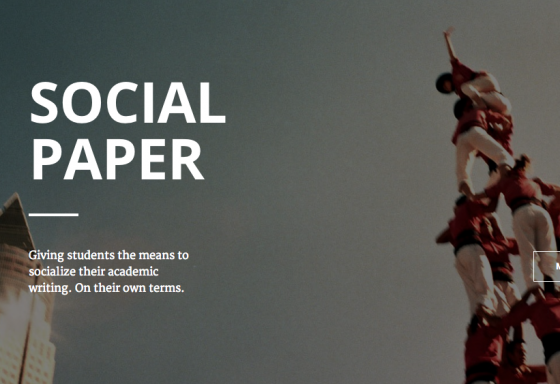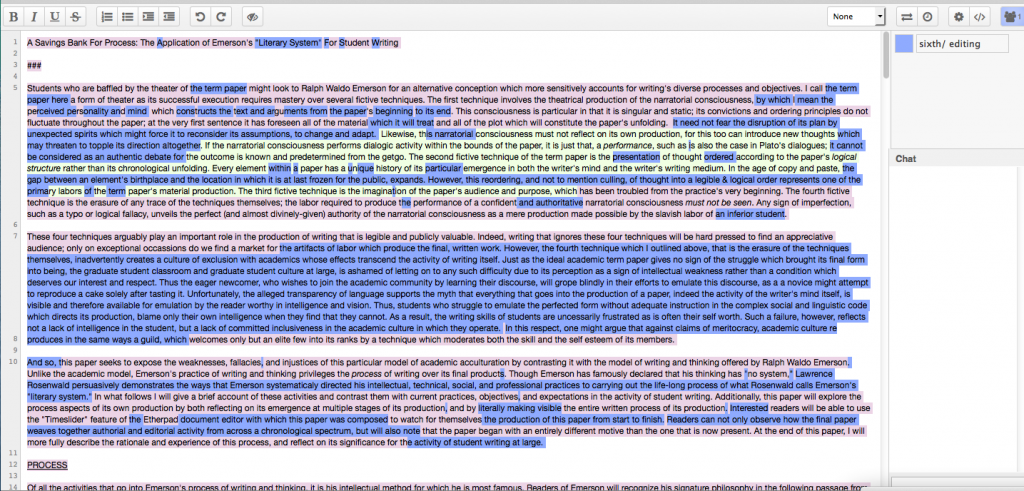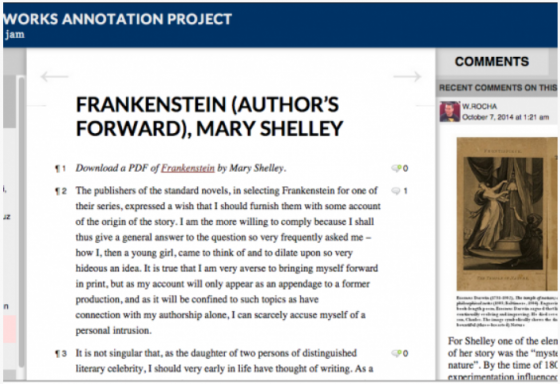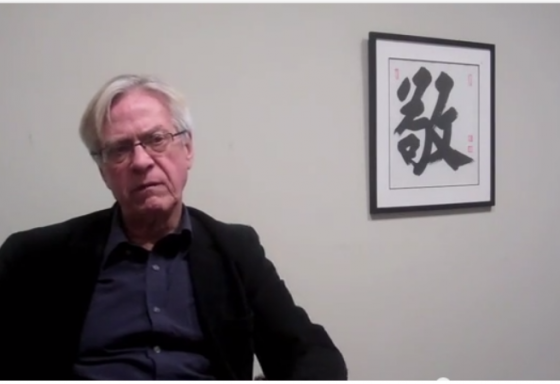Social Paper
 In an age when “sharing” is as easy as pushing a button, student papers are still largely written for the audience of a single professor. By denying students the opportunity to generate and engage an authentic public for their writing, our mass practice of education divorces the act of writing from a sense of having real impact in the world. And so, I developed the idea for Social Paper, a durable, global commons for in-progress student writing, based on ideas from Kathleen Fitzpatrick’s Planned Obsolescence and my own frustration with current practices and technologies of sharing student writing and feedback. With the help of Dr. Matthew K. Gold and urban education student Ph.D. Jennifer Stoops, Social Paper turned into a free and open source software project funded by a 2014 NEH Digital Start-Up Grant and CUNY Advance Grant, with advisement support from Kathleen Fitzpatrick, Director of Scholarly Communication at the Modern Language Association, and Edward Finn, Founding Director, Center for Science and the Imagination, Arizona State University.
In an age when “sharing” is as easy as pushing a button, student papers are still largely written for the audience of a single professor. By denying students the opportunity to generate and engage an authentic public for their writing, our mass practice of education divorces the act of writing from a sense of having real impact in the world. And so, I developed the idea for Social Paper, a durable, global commons for in-progress student writing, based on ideas from Kathleen Fitzpatrick’s Planned Obsolescence and my own frustration with current practices and technologies of sharing student writing and feedback. With the help of Dr. Matthew K. Gold and urban education student Ph.D. Jennifer Stoops, Social Paper turned into a free and open source software project funded by a 2014 NEH Digital Start-Up Grant and CUNY Advance Grant, with advisement support from Kathleen Fitzpatrick, Director of Scholarly Communication at the Modern Language Association, and Edward Finn, Founding Director, Center for Science and the Imagination, Arizona State University.
I've read this 3x now; the most important educ. piece of the year: @erinroseglass' manifesto for open writing. https://t.co/r0uZzjU06B
— john maxwell (@jmaxsfu) December 14, 2015
Ongoing experiments with writing technologies

As part of my ongoing praxis-oriented research in writing technologies, I used Etherpad, an online word-processing platform, to record the entire process of writing a paper on Ralph Waldo Emerson’s extensive note-taking system. Interested readers can visit this Etherpad document to view a time-lapse playback of the paper’s creation in which different colors signify different writing sessions. In this paper, “A Savings Bank For Process: The Application of Emerson’s ‘Literary System’ For Student Writing” I argue that process, not merely publicity, must guide the design of our digital writing tools and examine how the culture of secrecy surrounding the academic writing process inhibits the development of digital writing tools that allow for private and public forms of ongoing reflection. I welcome any comments or ideas on the draft on the Social Paper platform here.
Annotation Project at Baruch College
 I served as facilitator and consultant for The Annotation Project at Baruch College, an ongoing program which utilizes digital annotation tools in undergraduate literature courses to enable students to collaboratively annotate reading assignments. In addition to creating the digital infrastructure and advising on further program development, I work closely with Annotation Project’s Director Cheryl Smith to gather student and teacher feedback with the goal of further developing digital tools to meet specific pedagogical needs.
I served as facilitator and consultant for The Annotation Project at Baruch College, an ongoing program which utilizes digital annotation tools in undergraduate literature courses to enable students to collaboratively annotate reading assignments. In addition to creating the digital infrastructure and advising on further program development, I work closely with Annotation Project’s Director Cheryl Smith to gather student and teacher feedback with the goal of further developing digital tools to meet specific pedagogical needs.
Mellon Interdisciplinary Science Studies Public Humanities Video Project
 During my first year as a Mellon Interdisciplinary Science Studies Fellow, I developed and carried out a video project that interviewed professors and students about their interest in science studies, as well as documented the groups events. I carried out video interviews and talks from start to finish with Jesse Prinz, Sarah Franklin, Linda Smith, Ashley Dawson, Peter Godfrey-Smith, Alva Noe, Bryan Turner, Eben Kirksey and more. As of January 2016, the videos have received 11,400 views. The full video series can be found here.
During my first year as a Mellon Interdisciplinary Science Studies Fellow, I developed and carried out a video project that interviewed professors and students about their interest in science studies, as well as documented the groups events. I carried out video interviews and talks from start to finish with Jesse Prinz, Sarah Franklin, Linda Smith, Ashley Dawson, Peter Godfrey-Smith, Alva Noe, Bryan Turner, Eben Kirksey and more. As of January 2016, the videos have received 11,400 views. The full video series can be found here.
For more information regarding my scholarly activities, please see my talks, digital projects, dh training, or CV.